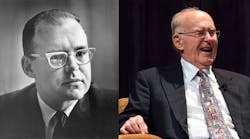IndustryWeek would be remiss not to comment on the death of Gordon Moore, co-founder of Intel, who passed away last week on March 24 at the age of 94. While his greatest legacy may be helping to birth the first commercially viable integrated circuits, the technology that effectively paved the way for the modern, digital world, his famous prophetic prediction in 1965 may also stand the test of time.
Put very simply, Moore's Law states that every two years the number of transistors on an integrated circuit double—effectively doubling computer power exponentially without a concurrent increase in costs.
The first personal computer debuted over 50 years ago at an adjusted price in today's dollars of around $5,000. In 2023 you can walk around with a smartphone in your pocket that can run artificial intelligence and on sale costs less than $300.
Moore began his scientific career with a Ph.D. in chemistry in 1954 from the California Institute of Technology and then a job at the Johns Hopkins Applied Physics Laboratory.
In 1956 he joined Shockley Semiconductor, a pioneer in semiconductor development; co-founded his own company, Fairchild Semiconductor, in 1957; and in 1968 co-founded Intel where he served as executive vice president until 1975, ascended to chairman of the board and CEO until 1987 when he gave up the CEO position.
He continued serving as a chairman, then a chairman emeritus and stepped down in 2006, continuing to serve as chairman of the board for the Gordon and Betty Moore Foundation that was founded in 2000. He transitioned to chairman emeritus of the foundation in 2018. It has donated more than $5.1 billion to charitable causes.
Intel, of course, continues to be a fundament of the modern computer industry, specifically in semiconductor manufacturing, leading the charge to reshore high-end chip production.
About the Author
IW Staff
Find contact information for the IndustryWeek staff: Contact IndustryWeek
